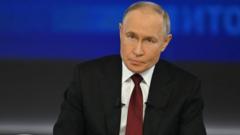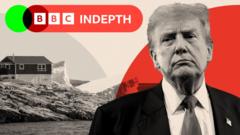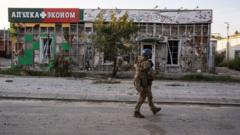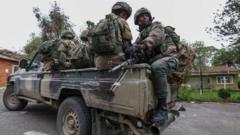Vladimir Putin stated during his end-of-year press conference that Russia should have invaded Ukraine sooner and highlighted the need for systemic preparation. He addressed various topics, including international relations with China and the U.S., the war in Ukraine, and domestic challenges, all while showcasing a narrative that emphasizes Russian sovereignty and military progress.
Putin Reflects on Ukraine Invasion and Global Relations in Year-End Address

Putin Reflects on Ukraine Invasion and Global Relations in Year-End Address
In a televised end-of-year press conference, Russian President Vladimir Putin discusses the Ukraine conflict, nuclear strategy, and relations with global powers.
In a lengthy televised address titled "Results of the Year with Vladimir Putin," the Russian President reflected on the ongoing conflict in Ukraine, acknowledging that an earlier full-scale invasion might have been advisable. Putin described the military action in Ukraine as a "special military operation" and suggested that better preparation could have altered the course of events. During the event, which lasted four hours and included a meticulously curated audience, he faced questions from the public, journalists, and pensioners while appearing next to a large electronic map of Russia.
Putin remains resolute in his view of Russia's territorial integrity, asserting that the annexation of Crimea in 2014 and the current military activities in Ukraine support the recovery of Russia's sovereignty. When pressed by BBC journalist Steve Rosenberg about Russia's condition compared to the legacy of Boris Yeltsin, Putin confidently stated that the nation has regained its sovereignty, diverging from an era when it seemed on the brink of losing it altogether.
The Russian leader also touched on international issues, such as the situation in Syria, claiming that the Assad regime’s troubles do not amount to a defeat for Moscow, and noted his intent to engage with Syria's new leadership. Putin reaffirmed Russia's position in global geopolitics, particularly in light of its close ties with China, which he said have never been stronger.
On the subject of the war in Ukraine, Putin characterized his military as making daily progress and reiterated his openness to potential compromises to bring the conflict to a close. However, specifics on these compromises were not forthcoming. He took pride in improvements made in previously occupied territories, citing advancements in infrastructure.
Addressing his country's nuclear doctrine, which allows for strikes against perceived threats, Putin indicated that Western powers would need to understand the implications of this new policy. He referred to a new ballistic missile, the Oreshnik, and provocatively proposed demonstrating its capabilities against Ukrainian air defenses.
Throughout the press conference, a recurring theme was the assertion of "Russian sovereignty." He mentioned that the economy, despite facing challenges like a 9.1% inflation rate and dependence on military production, remains strong, particularly when compared to economies of Western nations. Putin also engaged with various domestic concerns, such as the public’s reaction to scams and housing challenges faced by youth.
As his year-end address drew to a close, Putin’s remarks painted a picture of a Russia that aspires to assert itself on the global stage while managing both internal and external pressures.





















